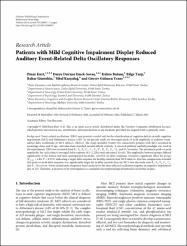| dc.contributor.author | Kurt, Pınar | en_US |
| dc.contributor.author | Emek Savaş, Derya Durusu | en_US |
| dc.contributor.author | Batum, Kübra | en_US |
| dc.contributor.author | Turp, Bilge | en_US |
| dc.contributor.author | Güntekin, Bahar | en_US |
| dc.contributor.author | Karşıdağ, Sibel | en_US |
| dc.contributor.author | Gülmen Yener, Görsev | en_US |
| dc.date.accessioned | 2016-04-06T13:57:46Z | |
| dc.date.available | 2016-04-06T13:57:46Z | |
| dc.date.issued | 2014 | |
| dc.identifier.citation | Kurt, P., Emek Savaş, D. D., Batum, K., Turp, B., Güntekin, B., Karşıdağ, S., Gülmen Yener, G. (2014). Patients with Mild Cognitive impairment display reduced auditory event-related delta oscillatory responses. Behavioural Neurology. 2014, 1-11. | en_US |
| dc.identifier.issn | 0953-4180 | |
| dc.identifier.uri | https://hdl.handle.net/20.500.12294/289 | |
| dc.identifier.uri | http://dx.doi.org/10.1155/2014/268967 | |
| dc.description | Kurt, Pınar (Arel Author) | en_US |
| dc.description.abstract | Background. Event-related oscillations (ERO) may provide a useful tool for the identification of cognitive deficits in mild cognitive impairment (MCI) and Alzheimer’s disease (AD). In the present study, we investigate peak-to-peak amplitude of auditory eventrelated delta oscillations of MCI subjects. Method. The study included twenty-two consecutive patients with MCI recruited in neurology clinic and 21 age- and education-matched normal elderly controls. A classical auditory oddball paradigm was used in the experiments. EEG was recorded from F3, Fz, F4, C3, Cz, C4, P3, Pz, P4, O1, Oz, and O2 locations. The maximum peak-to-peak amplitudes for each subject’s averaged delta response (0.5–2.2 Hz) were measured. Results. The amplitudes between groups differed significantly at the frontal and mid-centroparietal locations. ANOVA on delta responses revealed a significant effect for groups (F(1.41) = 4.84, ?? = 0.033), indicating a larger delta response for healthy controls than MCI subjects. Post hoc comparisons revealed that peak-to-peak delta response was significantly larger for healthy controls than for MCI over electrode sites F3, Fz, F4, Cz, C4, and Pz. Discussion. Event-related delta frequency band seems to be the most affected oscillatory response in cognitive impairment due to AD. Therefore, it deserves to be investigated as a candidate electrophysiological biomarker in further studies. | en_US |
| dc.language.iso | eng | en_US |
| dc.publisher | Hindawi Publishing Corporation | en_US |
| dc.relation.ispartof | Behavioural Neurology | en_US |
| dc.rights | info:eu-repo/semantics/openAccess | en_US |
| dc.title | Patients with Mild Cognitive impairment display reduced auditory event-related delta oscillatory responses | en_US |
| dc.type | article | en_US |
| dc.department | İstanbul Arel Üniversitesi, Fen Edebiyat Fakültesi, Psikoloji Bölümü. | en_US |
| dc.authorid | TR24351 | en_US |
| dc.authorid | TR227002 | en_US |
| dc.authorid | TR204666 | en_US |
| dc.authorid | TR9297 | en_US |
| dc.identifier.volume | 2014 | en_US |
| dc.identifier.startpage | 1 | en_US |
| dc.identifier.endpage | 11 | en_US |
| dc.relation.publicationcategory | Makale - Uluslararası Hakemli Dergi - Kurum Öğretim Elemanı | en_US |


















